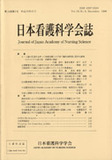Japanese
English
- 販売していません
- Abstract 文献概要
- 参考文献 Reference
要旨
本研究の目的は,HOT患者のリハビリテーションプログラム開発のための第一段階としてHOT患者のQOL尺度の信頼性・妥当性を検討し,QOLの関連要因を明らかにする.さらに,これらの関連要因をもとに看護介入のためのアセスメント試案を作成しその有効性を検討することにある.
①本研究で使用したQOL尺度の内容的妥当性は研究者10名の一致率から,構成概念的妥当性はHOT患者のQOL尺度の因子分析結果において,信頼性はCronbachα係数から確認された.
②HOT患者のQOLの関連要因としては,「呼吸困難の程度」,「生活動作の自立度」,「ストレス認知」,「重要他者の心理的サポート」の4要因が抽出された.これらの関連要因とQOL尺度得点の高群と低群の2群間で有意差が認められ,看護介入の必要性が示唆された.
③HOT患者における関連要因をもとにしたアセスメント指標(NIA for HOTP)案の弁別力は,NIA for HOTP案得点とQOL尺度得点±1SDとなった患者との人数比較から支持された.また,NIA for HOTP案を使用した看護介入への有効性は事例から確認できた.しかし,個別の詳細なアセスメント能力には限界があると予想される.
Abstract
The objective of this study is to investigate the reliability and validity of the quality of life (QOL) scale for patients on home oxygen therapy (HOT), and to identify factors associated with QOL, as the first step in developing a rehabilitation program for HOT patients. The study also aims at formulating a tentative assessment plan for nursing intervention on the basis of these associated factors, and at evaluating its effectiveness.
(1) Content validity of the QOL scale used in this study was determined by the degree of consensus among 10 researchers, the construct validity was determined on the basis of the results of factor analysis of the QOL scale for HOT patients, and reliability was determined by the Cronbach's α coefficient.
(2) Four factors, i.e., “the degree of dyspnea,”“the degree of independence in daily life activities,”“stress recognition,”and“psychological support by an important third person,”were selected as the factors associated with the QOL of HOT patients. Significant differences in these associated factors were noted between the group with high QOL scale scores and the group with low QOL scale scores, and the necessity of nursing intervention was suggested.
(3) The discriminating ability of this tentative assessment plan (NIA for HOTP) based on the associated factors in the HOT patients was supported by comparison of the scores on NIA for HOTP and the QOL scale score±1 SD in terms of the number of patients. The effectiveness of nursing intervention using NIA for HOTP could be con-firmed by case studies. However, there appear to be some limitations in terms of making detailed assessments of individual cases.
Copyright © 1998, Japan Academy of Nursing Science. All rights reserved.


